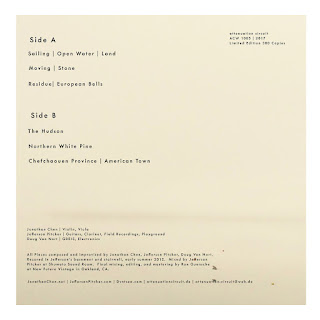Interview with Don Campau
1.There is a moment in almost every musician's creative life that is and will be remembered as some sort of critical point when you move towards some area that you are able to express yourself. An inspiration that makes you think: I might want to try it and do it. What was it for you?
When I heard “On Broadway” late at night by The Drifters on the crystal radio set ( with one earphone) that my Mother had given me.
Then, the first record I bought was “Twist And Shout” By The Beatles. I was hooked from that point. I was about 12 years old.
Early on I heard early Pink Floyd and The Mothers Of Invention which led me to composers like Varese, Cage and Stockhausen, and Harry Partch. Not long after that the world of ethnic music became known to me and the transformation and education continues…to this day. My good friend Geoff Alexander got me first involved in radio in 1971 ( he had a show since he was 17 or so ) and he introduced me to my main mentor, Lorenzo W. Milam, a writer, troublemaker and one the Fathers Of Community Radio in America. Lorenzo educated, insulted, infused Buddhist lessons into his personal playbook, and taught us all valuable lessons in life. He was one of the most influential individuals ever in American media. He wrote several books and I am proud to say I was along for the ride on a few of his exploits.
2. How did you start your relationship with your instrument and compositions?
Somehow I got a very bad acoustic guitar was I was about 15 or 16. I never studied or had lessons but after hearing Ravi Shankar I tried to imitate that form of improv on the guitar. Rudely and badly however.
My late brother Chris also played guitar and sang and in many ways although he was 4 years younger he gave me confidence to sing and play. Later, Chris and I were into John McLaughlin and jazz and used to jam furiously and at high speed.
3. You have been active with your own label as well as promoting other artists' work - how did it start and what lies ahead?
My “label” was nothing more than me having a bunch of stuff already recorded and I made a little catalogue. I added some friends and archival material and I was off and running.
After I discovered the underground Cassette Culture Network in 1984 I thought “why
not”.
I already had a radio show here in the SF Bay Area so I decided to change my format to home recorded cassettes, all styles. I traded tapes, played them on my show, made friends around the world. That continued for 35 years until I called it quits in 2019.
But, my wife Robin ( also a singer and home taper) and I moved north of San Francisco after spending some years in San Jose ( the heart of Silicon Valley). We needed a change and found a good home in Santa Rosa in Sonoma County.
I quickly found the local community radio station and have been doing shows at KOWS for almost 15 years now. I have been the Program Director for several years now.
What are your inspirations when it comes to style and creative process in your own work? Music wise and beyond.
I go through phases with music but am influenced by many styles of music and creation. My own music is mostly a hybrid form of rock with some punk overtones. I like to make my music personal and that's how you really get to know me….though my music. I also do instrumental forms too and highly experimental things as well. I like variety but also infused with humour and sarcasm.
5. How are your feelings towards collaborating?
I have done many, many collaborations. One of the first was a two tape set I did in 1986 called “Pinata Party” that featured Dino DiMuro, Ken Clinger, Mark Hanley and James Hill. Plus my three kids! It was full of life and probably too full of shaky , unformed songs and could have benefitted from extreme editing. It was shipped in elaborate packaging with confetti, candy, stickers, toys and two cassette tapes in a clear strawberry container that I stole from my job in the produce dept. The good thing to me is that I still have these friends for all these years and we are part of each others lives. The personal connection is the most important thing to me.
And, as you may know, I married my home taper sweetheart, Robin O’Brien, after a long distance romance in the mid 90s. We are currently growing old and encouraging our many grand kids these days, in Northern California together.
6. How do you feel in an ever changing world of musical distribution? How difficult is it at the moment to promote your own music?
I don’t really worry too much about promotion. I have no interest in the music business or in sales.I do use social media a bit and try to let people know about my new projects but frankly, I do not do a good job. And I just don’t care. My main goal is to make friends, and do music projects with others and have connections around the world.
7. Plans for the future?
After my heart attack and other health adventures I think I might have a couple more spins around the universe for a little while longer. I’ll just keep doing my music, my radio shows and my art.
Join me at doncampau.com
if you want to join along.







Comments
Post a Comment